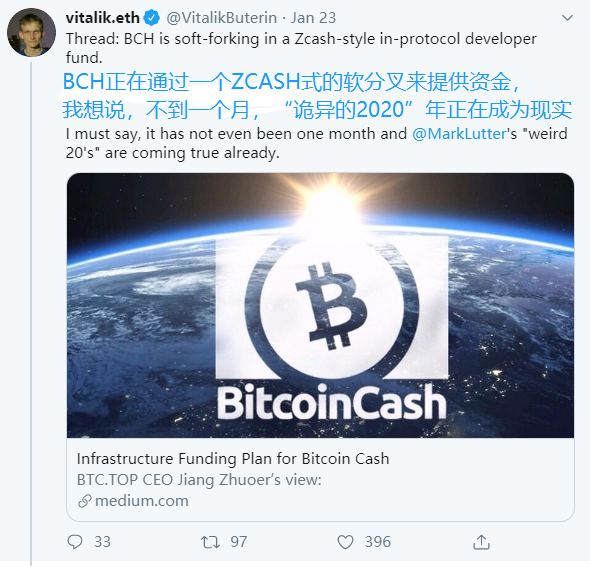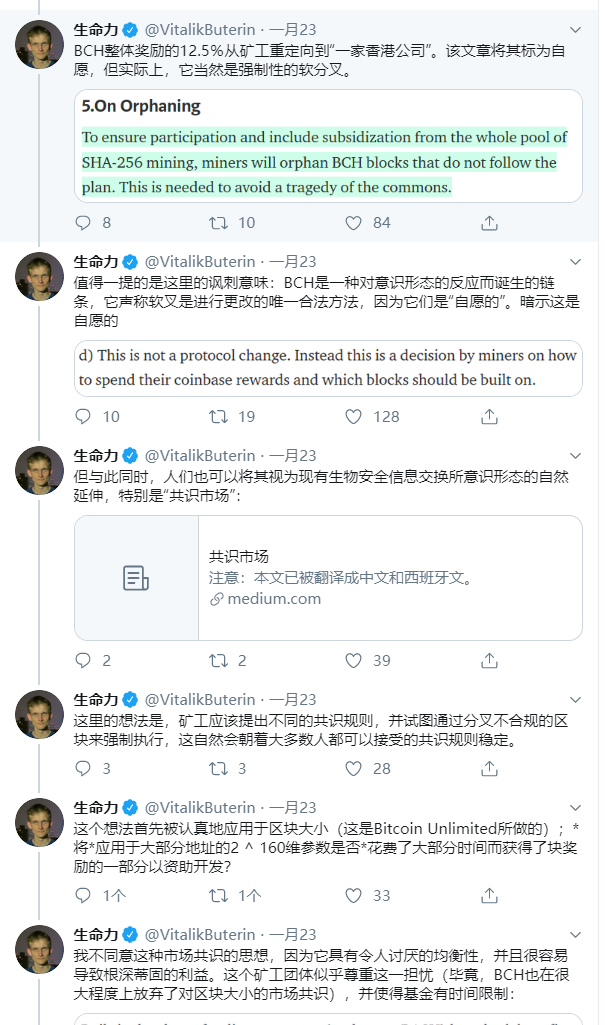BCH levies a 12.5% compulsory tax on miners sparking widespread discussion: Who will support the development team?

Yesterday, BTC.TOP's CEO Jiang Zhuoer and Bitmain's Wu Jihan, ViaBTC's Yang Haibo, and Bitcoin.com's Roger Ver jointly released the "Bitcoin Cash Infrastructure Financing Plan" .
In this plan, a solution is proposed for the further development of BCH: a 12.5% tax is imposed on miners. This led to discussions among all parties, and then extended to a very serious question: "Who maintains the decentralized code?"
❖
- Dialogue with Zhu Ning: Digital currency is an inevitable trend
- There are now 784,000 Bitcoin addresses holding more than 1 BTC. Will this affect the price?
- Professor Wu Da: A + B (AI Fusion Blockchain) is the development direction of future blockchain and artificial intelligence technology
In Satoshi Nakamoto's white paper, the rewards for miners are clearly written, including the initial mining rewards and subsequent fee income.
However, no mention was made of the benefits of the development team. For a long time, each decentralized chain must be maintained by a certain centralized organization. Where does the cost of this maintenance come from?
Early bitcoins were developed for free and maintained by volunteers and enthusiasts. But in fact, the source of funding for Bitcoin developers has also been a problem.
After Satoshi Nakamoto disappeared, Gavin Andresen, the successor appointed by Satoshi Nakamoto, had encountered funding problems while maintaining the Bitcoin client, and initiated fundraising in the community. The funds raised were not enough to maintain development. Andresen turned to outside help.
Subsequently, Andresen became a founding member of the Bitcoin Foundation, and was able to obtain a regular amount of funds, which he allocated to the developers who maintain the core Bitcoin client. With the intervention of external funds and forces, the problem seemed to be solved.
But as Jiang Zhuoer said, the Bitcoin core development team also faces the problem of balancing the interests. In order to protect their own interests, the development team may not choose the path that is most beneficial to Bitcoin, but instead choose the path that is most beneficial to the development team— —Although the two seem to be unified with each other, in fact there are still subtle differences, which is one of the reasons Jiang believes that the block expansion dispute.
❖
Now, BCH also faces this problem.
A long time ago, the BCH community has discussed and considered the taxation of miners for development-because the interests of miners and developers are integrated, in principle miners have reasons and motivation to support.
And now, this proposal is being implemented. In Jiang Zhuoer's plan, a short-term attempt is planned to implement a 6-month short-term donation plan: before the bull market of 2020, 2021, or even 2022 arrives, provide sufficient development funds for BCH developers to accelerate The development of BCH.
If the amount of funds is calculated at $ 300 each, the total is $ 6.07 million.
The allocation of funds is clearly stated in the plan: "A Hong Kong company has been established to legally accept and allocate funds".
What if a miner does not agree? An orphan block plan will be implemented at the development level: a kind of soft fork, if you disagree, the coins you mine will be useless.
Taken together, this plan actually talks about several issues:
First, it is necessary to obtain sustainable development through this form.
The second is that it is currently an experimental stage, yes or no, let's talk about it first.
The third is that miners have to do it if they don't, and isolate you if they don't.
❖
Views on this matter are different, but it seems that they are generally not too agreeable, especially the solitary block protocol, which is very overbearing and makes people feel worried about the centralization of BCH.
The founder of Litecoin said:
"At present, the coal miner alliance only has about 28% of the computing power of the BCH network. Unless they call for more computing power, they cannot enforce this soft fork. And this may lead to many forks. Adding such a centralized feature will set a bad precedent. If this soft fork passes, it will be very unstable because there will be large BTC miners motivated to carry out 51% attacks. They can switch to BCH, then mining 11 blocks in a row, and then they got all the BCH, which is at least 14% higher than the profit of mining BTC. "
What Li Qiwei means is that although the fork is currently supported by many big brothers, the hash power occupied is still too small, which may lead to further forks and even attract BTC hash power attacks.
It should be known that the entire network does have a lot of mysterious and unpredictable computing power. If the BCH forks and chaos then leads to further attacks-for example, CSW has an ideal reason to shoot, which may cause further confusion.
The point is, Li Qiwei thinks that this will set a bad precedent: a decentralized currency, and the result is completely dominated by centralization.
❖
And the most excited big man may be V god, he called it the first performance of "Strange 2020".

And issued several Weibo in succession in opposition, I translated it with GOOGLE:

It roughly means:
——BCH on the one hand is called voluntary, but on the other hand it is not at all;
——I have been used as a consensus mechanism for highlight publicity, but now I have been faced;
——How does the claimed Hong Kong company ensure that the money is used for development?
-I hate doing this because it breaks the balance and leads to a greater link of interests.
Looking back, how did Ethereum solve this problem? In the beginning, I raised a sum of money through 1CO, and at the same time, 12 million Ethereums were entered into the Ethereum Foundation, which has always been running relatively well.
Bitcoin has almost the same long history of Litecoin, and it is mainly operated by the foundation. However, for a long time, Litecoin founder Li Qiwei donated 80% of the total funds to the foundation. After decreasing, the Litecoin Foundation has also been plagued by a shortage of development funds.
Due to the shortage of funds, ETCDEV, the main development team of ETC, announced its suspension in December 2018. Although ETCDEV is only a member of the ETC development team, it also shows to a certain extent that development funds are indeed a problem.
Twelve years ago, when Satoshi Nakamoto created Bitcoin, he must have enjoyed the process. So he didn't indicate in his white paper how to get the benefits for himself and later developers.
Maybe he thinks that there will always be people who really love and believe in Bitcoin to maintain it?
(End of full text)
We will continue to update Blocking; if you have any questions or suggestions, please contact us!
Was this article helpful?
93 out of 132 found this helpful
Related articles
- 2020 Top Ten Technology Trends: From Hyper Automation to Blockchain
- Weighing the pros and cons, the World Economic Forum creates a CBDC policy maker toolkit
- The Lightning Network Torch ignites again, for this time?
- Another step closer, Ethereum 2.0 "channel" is verified
- Swiss bank first enters the BTC era
- "Central Bank Digital Currency Working Group Meets with Relevant Company Personnel in Shanghai" is false information, the rumorist has been sentenced to administrative detention for 5 days
- Inventory of digital securities (STO) events in 2019




